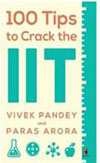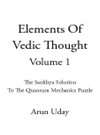
![]()
Updates and Information on upcoming events from the alumni association.
MORE >>

Welcome to the latest section of Alma Matters “Bookshelf” - a platform where people can share their comments, feelings and thoughts about various books they read. From business and economics to SCI-FI, thriller and comedy…please feel free to contribute to this section by writing to us at alumni_relations@isb.edu
Books published by Alumni
We are happy to share that Vivek Pandey from the PGP Class of 2010 has recently had his book published by Penguin Books under its Portfolio imprint.
Authors: Vivek Pandey & Paras Arora
 About the Book: The book is titled "100 tips to crack the IIT" and is an informal guidance for aspirants to the coveted IITs based on the authors’ personal experiences. It not only answers questions about all things physics, chemistry and maths but also addresses issues that students worry about and don’t know whom to ask:
About the Book: The book is titled "100 tips to crack the IIT" and is an informal guidance for aspirants to the coveted IITs based on the authors’ personal experiences. It not only answers questions about all things physics, chemistry and maths but also addresses issues that students worry about and don’t know whom to ask:
• Night owls vs early risers
• What does one do in class 11?
• Writing a formula 84 times to remember it
• Using WWE-style cards to make learning fun
• Colour-coded notebooks
• Getting the most out of lab experiments
The link to the book is http://www.penguinbooksindia.com/en/content/100-tips-crack-iit
Arun Uday from the PGP Class of 2003 has also released his book on Science and Vedanta titled “Elements of Vedic Thought Volume 1 – The Sankhya Solutions to the Quantum Mechanics Puzzle”. Arun currently works in a private equity firm in Mumbai and has been studying Vedic philosophy for over two decades.
 About the Book: Ever since the inception of modern science, the course of progress that it has traversed is one that has been increasingly divergent from religion. As a result, it is now believed that science and religion are fundamentally opposed to each other. The reason for this is that as science has unearthed more and more of nature’s laws, it has penetrated deeper and deeper into the causal forces that operate therein. As such, most people now believe that religion (which purports a transcendent cause to nature) is a redundant institution insofar as the rigorous description of the universe is concerned. Further, the technological benefits that have accrued as a result of scientific progress as also the inability of religion to objectively defend its own tenets in the wake of the scientific march of knowledge have only further weakened its stature and precipitated its intellectual downfall. This work is a humble attempt to arrest and even reverse this seemingly inexorable trend.
About the Book: Ever since the inception of modern science, the course of progress that it has traversed is one that has been increasingly divergent from religion. As a result, it is now believed that science and religion are fundamentally opposed to each other. The reason for this is that as science has unearthed more and more of nature’s laws, it has penetrated deeper and deeper into the causal forces that operate therein. As such, most people now believe that religion (which purports a transcendent cause to nature) is a redundant institution insofar as the rigorous description of the universe is concerned. Further, the technological benefits that have accrued as a result of scientific progress as also the inability of religion to objectively defend its own tenets in the wake of the scientific march of knowledge have only further weakened its stature and precipitated its intellectual downfall. This work is a humble attempt to arrest and even reverse this seemingly inexorable trend.
The approach adopted here is to pick on some of the most important fundamental unsolved problems within physics and propose scientific solutions to the same based on the Hindu texts of knowledge, a.k.a. the Vedas. In so doing, it is argued herein that the reason that these problems within physics have remained unsolved despite the best scientific brains engaging on them for over a century is that there is a fundamental misconception of causality within science. The contention here is that physics is an effectual study of matter in that it only predicts the sequence of effects without needing to explain the causal basis for them. Therefore, the proposed solutions to these problems have been derived based on the causal theory of the Vedic physical sciences (a.k.a. Sanhkya), which is also inherently amenable to the theistic school. In this way, the deep intellectual conflict between science and religion is attempted to be resolved. It is hoped that this should lay the foundations of a new science that is not in fundamental conflict with religion and result in a more harmonious coexistence of these two great intellectual institutions.
The book is available on Pothi.com http://pothi.com/pothi/book/arun-uday-elements-vedic-thought-volume-1










